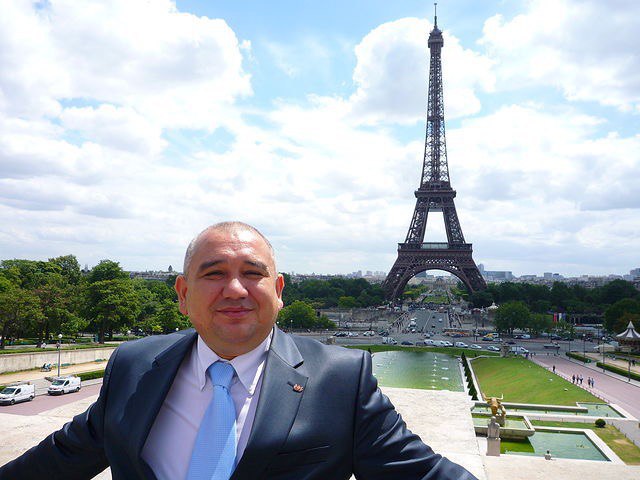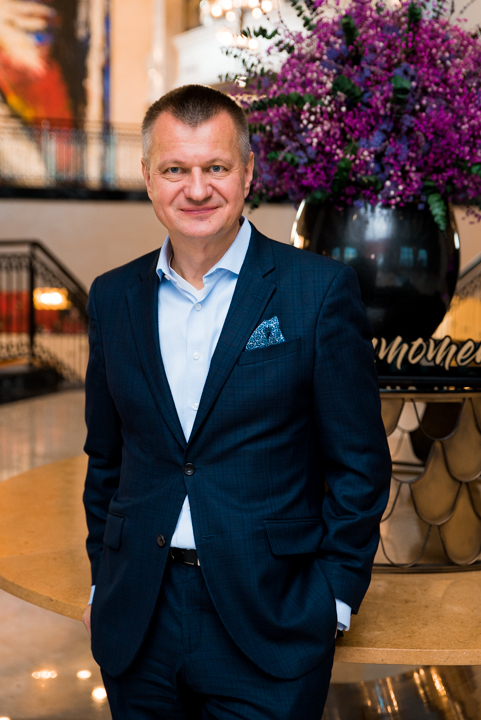HOTEL MANAGEMENT ‘INSIDE OUT’ FOR LOCALS AND INTERNATIONALS
When it comes to a process as complex as hotel management, many tourists don’t even think about how many little things make up their holiday experience. This is especially true in countries where the hospitality industry has only recently emerged as an industry in its own right and is now developing at an accelerated pace to be competitive. The editors of OCA Magazine decided to ask experienced hoteliers for their views on the state of the industry.
OCA GUESTS


OCA: Please, tell us about yourself and the experience. What were the highest points and achievements for you?
Farkhod Tashtemirov (FT): I was born on 30 April 1971 in the Kishlak of Eshimaksak, Samarkand province. In 1993 I graduated from one of the best Russian universities with a degree in political science and returned to Tashkent, where I worked in the Ministry of Foreign Economic Relations of the Republic of Uzbekistan, then in the Small and Private Business Support Fund, the Parliament of the Republic of Uzbekistan, joint stock companies and banks. And in 2007 I reached a turning point in my career – I started working in the hotel industry as the Director of Sales and Marketing at Dedeman Silk Road Tashkent Hotel. From that moment on, I fully realised that hospitality is not just a job, it is my calling. Working in this field gives me constant pleasure and I can see the results of my work in a very short time. In 2010, having successfully passed all the stages of interviews and tests, I was hired by the international company of the aparthotel chain operator, The Ascott Group, in its European office in Paris. I spent six months working in all the departments, services and divisions of the European headquarters, as well as in several of the chain’s hotels in Paris. I was then appointed General Manager of Citadines Freedom Square Tbilisi apart hotel and I am still proud that my hotel was ranked among the top 5 best hotels in the chain for the next 3 years in a row, according to guest reviews, occupancy rate, service level, etc. After several years of working in Baku and Novosibirsk, I received an offer from Dedeman Hotels & Resorts International to lead the team that would open the chain’s first hotel in Moscow. During these 2 years I gained valuable experience of opening a hotel in a very short time and after opening the hotel took the first place in www.tripadvisor.com rating among all Moscow hotels. I think this is a very important achievement for any hotel general manager. In 2016, I returned to Uzbekistan, where I now manage the Mercure Tashkent Hotel. I also consider one of my achievements to be the successful rebranding process of Lumiere Hotel & Spa Tashkent to Mercure, an international brand of Accor Hotels, a world leader in the hospitality industry.
Jesper Francl (JF): I have been immersed in the hospitality industry for over two decades, with a wealth of experience spanning various roles within prestigious hotel chains. My journey in hospitality began with positions in F&B outlets, gradually ascending through the ranks to management positions. Throughout my career, I’ve garnered invaluable insights and expertise in hotel operations, guest satisfaction, and team leadership. One of my proudest achievements includes spearheading the transformation of several properties into award-winning establishments, recognized for their exceptional service and elevated guest experiences.
OCA: What key changes in hotel business did you observe for the last 10 years?
FT: The hospitality industry, like many other industries, is evolving very fast and the major changes in the last 10 years are very closely related to the digitalisation of the hospitality industry in many aspects. In my opinion, a very important factor in the hotel business is e-reputation. Any hotel guest can write a review about the hotel, hotel services, and hotel staff on the Internet (www.tripadvisor.com, google.com, Yandex.ru, booking.com, etc.) at any time. A negative review, even if it is unreliable, will lead to the loss of potential guests of the hotel, will spoil the image and reputation of the hotel all the time it is online. A positive review will contribute to the development of the hotel, attracting new hotel guests, etc.
JF: Over the past decade, the hotel industry has undergone significant transformations driven by evolving consumer preferences and technological advancements. One of the key changes has been the shift towards personalised experiences, with hotels leveraging data analytics and guest feedback to tailor services and amenities. Additionally, sustainability initiatives have gained prominence, with hotels increasingly adopting eco-friendly practices to reduce their environmental footprint. Moreover, the rise of online booking platforms and social media has revolutionised the way hotels market themselves and engage with guests, emphasising the importance of digital presence and reputation management.
OCA: Do you feel the influence of the creative industries on the development of hotels? In what it is shown?
FT: Currently, the hotel industry in Central Asian countries is becoming increasingly competitive, and innovative technologies have a direct impact on the sustainable development of hotels. Creative industries are always connected to the hotel business. Modern hotels cannot be imagined without modern architecture and design, print and digital products, online and offline advertising, audio-video products that convey information about hotels and their services, and much more.
JF: As the General Manager of Rixos Borovoe hotel, I don’t particularly feel a direct impact of the creative industries on hotel development. Our focus primarily lies on delivering exceptional hospitality experiences tailored to our guests’ needs and preferences. While we appreciate and value creativity in various forms, such as design concepts and guest experiences, our approach to hotel development is more rooted in providing excellent service, maintaining operational efficiency, and upholding the highest standards of quality and comfort for our guests.
OCA: What are the trends and problems now and what prospects are hotels waiting for in the next few years? Are there any regional factors that can play in a positive or negative way?
FT: Today, hotel guests have become more demanding. He or she links the quality of his or her holiday to the level of comfort and the programme of the stay in the city, so the ecosystem of the accommodation establishment and the possibilities of expanding the range of services are beginning to play a special role. In recent years, especially after the pandemic, the hotel industry has had to make serious changes. Common trends include digitalisation (mobile apps to sell additional hotel services, intelligent room management, contactless check-in, etc.). With the right use of artificial intelligence, hoteliers can surprise and attract more guests. The second strong trend is the meetings industry (formerly the MICE segment). Stimulation of business tourism and event organisers are important factors in attracting corporate clients, increasing occupancy and ROI of hotels. What is important for Uzbekistan now is the mass opening of hotels of different levels, including international chains. This is very important for the development of the country as a whole, because if there are many hotels with international brands, it means that the country is safe for guests from other countries.
JF: Currently, the hotel industry is navigating through unprecedented challenges, including the aftermath of the global pandemic and shifting consumer behaviours. While recovery remains a top priority, hotels are also contending with emerging trends such as the rise of remote work and experiential travel. Embracing technology and innovation will be crucial in addressing these challenges and capitalising on opportunities for growth. Additionally, there is a growing demand for tourist experiences, presenting hotels with opportunities to attract more guests and cater to diverse traveller preferences. However, amidst these opportunities, one significant challenge is the difficulty in finding skilled talent to meet the evolving demands of the industry. Regional factors, such as geopolitical stability, infrastructure development, and tourism policies, will play a significant role in shaping the prospects of hotels in the coming years. By staying agile, adaptable, customer-centric, and actively attracting talent, hotels can position themselves for success amidst uncertainty.
OCA: What will you advise the specialists who are part of the hotel business now?
FT: The hotel business is a very interesting, very attractive business. First of all, I recommend all young beginners to study, to learn not only the hotel business, but also mathematics, English and other languages. The second piece of advice is to have patience. Remember that your work will always be appreciated and you must work in a way that you enjoy.
JF: For specialists in the hotel business, I would advise staying agile and proactive in response to market dynamics and consumer preferences. Embrace innovation and leverage technology to enhance operational efficiency and guest experiences. Prioritise sustainability initiatives to align with evolving consumer values and industry trends. Cultivate a culture of continuous learning and development within your team, empowering them to deliver exceptional service and exceed guest expectations. Finally, foster strong partnerships with local communities, businesses, and stakeholders to create mutually beneficial relationships and drive sustainable growth.
